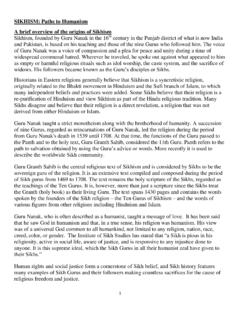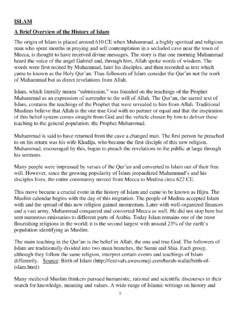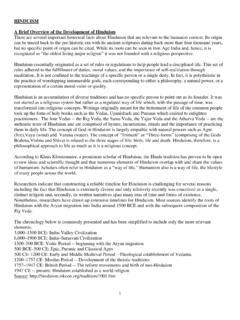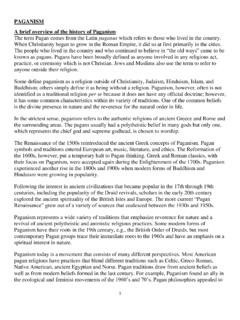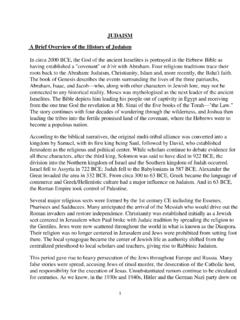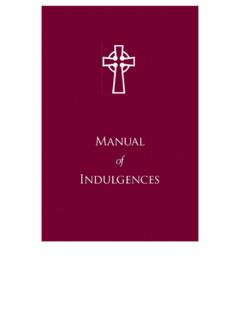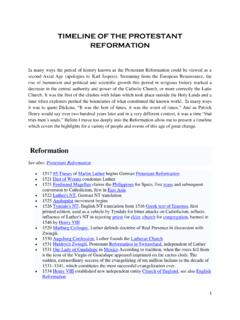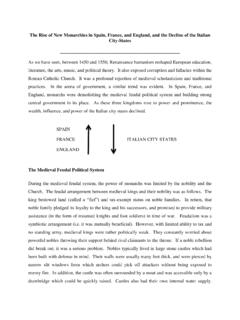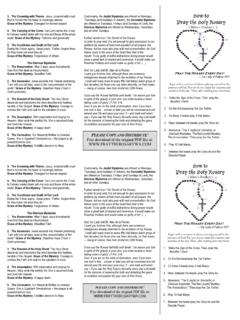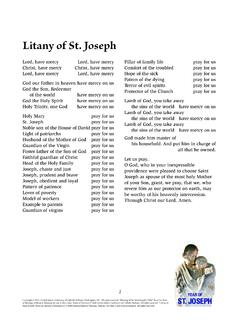Transcription of Protestantism A brief overview of the History of ...
1 Protestantism A brief overview of the History of Protestant Christianity During the Middle Ages the Roman Catholic Church held a virtual monopoly of faith in Western Europe. However, between the 14th and 17th centuries a series of Northern European reforms led to what is now called the Protestant Reformation culminating in a mass exodus from the near total control of Christianity from Rome. The Reformation began in 1517 when Martin Luther, an Augustinian monk, nailed 95 propositions to a church door in Wittenberg, Germany. These proposals for reform challenged many contemporary church practices. Committed to the idea that salvation only could be reached through faith and divine grace , Luther compiled the list of grievances known as the Disputation on the Power and Efficacy of Indulgences -- The 95 Theses.
2 The 95 Theses, which would become foundational to the Protestant Reformation, were written in a questioning rather than accusatory tone. The first two theses contained Luther's central belief that God intended believers to seek repentance and that faith alone, not deeds, would lead to salvation. Many other theses criticized the practice of indulgences, the granting of full or partial remission of the punishment of sin from direct payments to the Church. At the time Luther had no intention of starting a new Christian tradition but hoped to reform the Catholic Church. That was not to be. Instead of Catholic reformation, a new tradition - Protestantism - evolved in the decades that followed as Luther's arguments took root all while the Catholic Church resisted change. Luther developed the doctrine of justification by faith alone, where one's salvation can be secured only through faith rather than through individual good works or the intercession of any church.
3 Many of the origins of Protestant ideas come from the Dutch Renaissance figure and social critic Desiderius Erasmus. Perhaps his key contribution was his urging the people of his time to think and reason for themselves. He is often referred to as one of the greatest Christian humanists. Another contribution of Erasmus was the publication of his Greek-Latin New Testament, published in 1516, which Luther used primarily to translate the bible from its original Latin into German. The availability of non-clerical laypeople to digest the actual content of the New Testament helped spur the increasing popularity of the Reformation. Erasmus also laid the foundation for the Reformation not only by the translation of the New Testament but with the spread of his humanistic beliefs. Led by Erasmus, other thinkers, as well as the masses of church followers condemned the corruption of the Roman Church.
4 Erasmus contended that true religion depends on one's inward devotion rather than the outward displays of ceremony. By favoring the moral reform of the church and de-emphasizing the practice of didactic ritual, Erasmus laid the groundwork for Luther. Although Erasmus remained a Catholic throughout his life, he never gave up the quest for widespread Church reform. He has been 1. referred to as the intellectual father of the Reformation; in fact, historians have coined the phrase Erasmus laid the egg that Luther hatched.. As the Reformation developed in Germany, various groups in other parts of Europe began to break away from the Catholic Church. Reformed Christianity developed in Switzerland based on the teachings of Ulrich Zwingli and John Calvin. When it spread to Scotland under John Knox, the Reformed faith became known as Presbyterianism.
5 Switzerland was also the birthplace of the Anabaptists, spiritual ancestors of today's Amish, Mennonites, Quakers, and Baptists. Anglicanism, yet another protestant sect, was established in 1534 when Henry VIII of England broke away from the authority of the Pope. Anglicans became known as Episcopalians in America. Anglicanism itself has its roots in the Celtic Christianity of the earliest Britons and the Roman form of the faith brought to English churches in the 5th and 6th centuries. The Norman conquest of 1066 opened up English churches to German and Scandinavian pressure for church reform. Growing English dissatisfaction with papal authority and King Henry's desire to divorce Catherine of Aragon were key elements contributing to England's eventual break with the apostolic church. The subsequent Methodist tradition, based on the teachings of John Wesley, has its roots in Anglicanism.
6 With its emphasis on individual interpretation of scripture and a measure of religious freedom, the Reformation marked not only a break between Protestantism and Catholicism, but the beginning of Christian denominationalism as we know it today. While the major branches of Christianity basically hold the same fundamental creed, there are significant differences. While the Eastern Orthodox and Roman traditions combine the Scripture with the authority of church tradition or of a pope, Protestants prefer the Bible and individual consideration as the source of authority rather than church hierarchy. For the first time in post Catholic Christianity, Protestantism encouraged people to think for themselves and draw their own conclusions from scripture, rather than willfully accepting the interpretation and teachings of canonical authorities.
7 It is this process of independent thinking that was a competent of western thought that lead to the modern humanist movement. THE KEY PRINCIPLES OF PROTESTANT CHRISTIANITY. There are two primary dimensions of Protestant Christianity: ecclesiastical and secular. The latter focuses on social teachings, many of which are inclined toward humanism. While the motivation and inducements traditionally differ, Protestantism and humanism share many social goals. While the prime traditional motivator in Christianity is to please God, not all modern Christians see it that way. Today more and more agree with humanists that serving humankind should be the key motivating factor. Scholars have defined the basic Protestant religious doctrines in various ways. Luther, as noted, advanced the principles that salvation is achieved by faith alone and that religious authority 2.
8 Rests in scripture alone. While there still is diversity within and those who've taken their ow n approaches, these are the five doctrinal points that determine official Protestantism : -- Doctrine is by Scripture alone as opposed to papal decree or council edict. Sola Scriptura -- Justification is received by faith alone as opposed to works or sacraments. Sola Fide -- Salvation comes by grace alone. Sola Gratia -- Atonement for sins is by and through Christ alone. Sola Christus -- All glory is to be given to God alone. Soli Deo Gloria Source: Basic Protestant Beliefs ( ). These principles can be further limited to two: first, Nothing written by theologians that is not directly related to Biblical text can claim to have the same authority as the Bible itself and individuals can interpret the bible as they see fit; and second no person need depend on a clergyperson to mediate their relationship to and sense of God.
9 In her piece titled Liberal Protestant Beliefs , which appeared in , an independent media site that publishes articles on politics, social issues and religion, Pamela Ellgen indicates that Liberal Protestants come from various denominations, particularly mainline However, denominations do not define liberal Protestants; it is their underlying perspectives on truth, Jesus, morality and salvation that shape their beliefs.. Ellgen then presented the following liberal Protestant beliefs: -- Perspectives on truth: Many liberal Protestants believe that the Bible is a piece of literature about God more so than the literal word of God and that it should be read in its historical Other liberal Protestants see the Bible as the word of God but approach it more broadly and believe it is open to various interpretations.
10 -- Beliefs about Jesus: .. prominent liberal theologian Marcus Borg .. dismisses the physical bodily resurrection of Jesus on earth as inconsequential to the faith. He has written that Easter is not about believing in a spectacular long ago event, but about participating in what we see in Jesus.. -- Attitudes on morality: Liberal Protestants see Jesus' teachings as foundational to morality and ethics. They embrace his teaching on caring for the poor and accepting the marginalized in society. According to the website Beliefnet Liberal Protestants are more likely to be pro-choice and open to gay rights -- Beliefs about salvation: Some liberal Protestants have moved away from the concept of original sin and view humanity as fundamentally good with the free will to make good or bad choices. Salvation is less about a one-time event and more about a lifelong endeavor.
